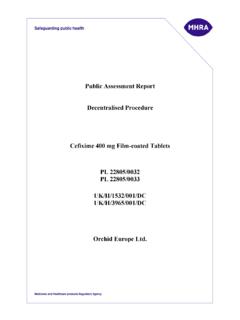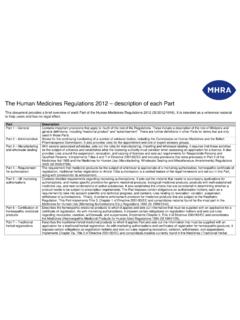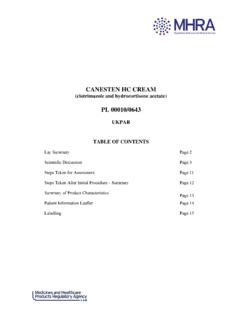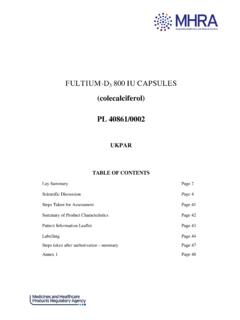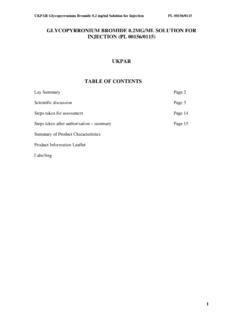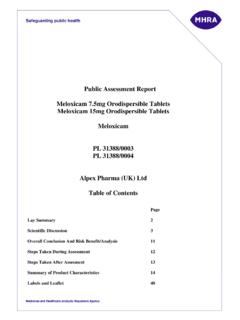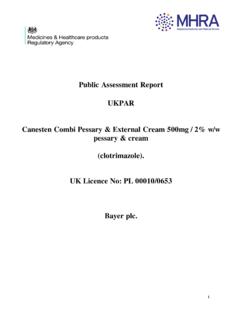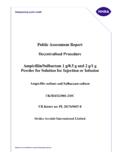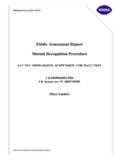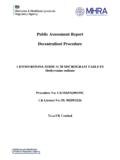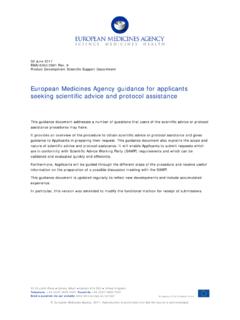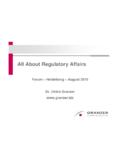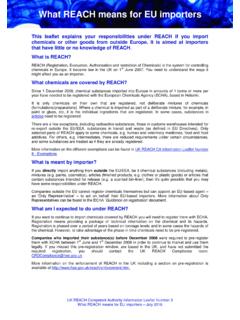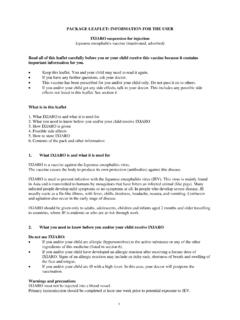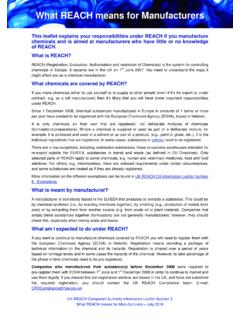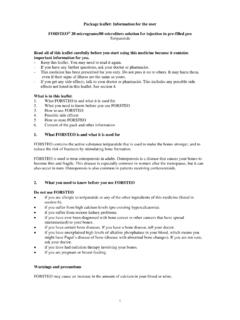Transcription of My medicine: Licensing (marketing authorisation) …
1 By law, before a medicine can be placed on the market, it must be given a marketing authorisation (product licence) by a medicines regulator. The UK regulator is the Medicines and Healthcare products Regulatory agency (MHRA). A specially trained panel of medicines assessors reviews all the available evidence arising out of the pre-clinical research and clinical trials. Manufacturers may also be asked to supply additional information. The MHRA also inspects the factory where the medicine is to be made, to make sure that supplies will be of a uniformly and consistently high standard. Why is Licensing important? The Licensing system is designed to: zGuarantee that all those involved are answerable for their actions zEnsure that processes, supplies, and quality can be thoroughly monitored zEnable swift corrective action to be taken when needed It is not influenced by the cost effectiveness or value for money of a medicine .
2 These issues are considered by the relevant UK bodies who decide which treatments to recommend to their respective health systems. Weighing up the pros and cons of a medicine Every medicine has side effects, ranging from minor to severe. And some rare side effects may not come to light until the medicine has been used millions of times. If the regulators waited for every side effect to be identified before Licensing a medicine this would deny patients useful treatments. Before granting a licence the MHRA needs to know whether the medicine : zWorks well with minimal harm for most people who will be taking it zIs acceptably safe. A high level of side effects in a medicine used to treat a life threatening condition, such as cancer, may be an acceptable trade-off, but not in one used to treat a minor ailment, such as hay fever. In this Why is Licensing important?
3 Weighing up the pros and cons of a medicine "Off label" or "unlicensed" prescribing The role of the European regulator My medicine : Licensing ( marketing authorisation ) In general, side effects are considered to be very common when they occur in at least one in 10 cases and uncommon when they occur in between one in 100 and one in 1000 cases. Side effects occurring in one in 10,000 cases are regarded as very rare. The MHRA will also want to know: zWhat impact a treatment will have on quality and length of life zIf the evidence backs up its use in ordinary circumstances, rather than those of a clinical trial zIf all the evidence on the known and expected side effects has been made available Under new legislation companies must also provide a risk management plan when applying for a licence for a new medicine . The plan includes: zKnown side effects, interactions with other drugs, and the types of patients not included in the clinical trials to date (safety specification) zAdditional research needed to fill in the gaps in knowledge about potential harm (pharmacovigilance) zHow the company intends to limit the risks to patients of the known side effects, including restricting access (risk minimisation) Only when the MHRA is satisfied that a medicine meets high standards of safety and quality, and that it works for the purpose intended, will the licence be granted.
4 This is denoted by a product licence or marketing authorisation number. Such careful scrutiny takes time to complete, and explains why a new medicine cannot immediately be prescribed to large numbers of patients. This level of scrutiny does not end after Licensing . Monitoring continues throughout the life of a medicine as more becomes known about it. Off-label or unlicensed prescribing Sometimes doctors find that a licensed medicine works well for a certain condition, age group, or at a dose for which it has not been licensed by the regulator. They prescribe it, based on their own and their colleagues experience, published studies, and findings presented at professional meetings. This is called off label prescribing. It is more likely to happen when there are either no alternatives, or where access to effective alternatives is restricted.
5 Sometimes doctors will also ask the MHRA to import a medicine that has been licensed outside Europe if they think this might help a particular patient, on what is known as a named patient basis or unlicensed use. The role of the European regulator Some medicines used in the UK are licensed by the European Medicines agency (EMEA) (external link) rather than the MHRA. Herceptin, used to treat patients with a certain type of advanced breast cancer, and the flu drug, Tamiflu, are two such examples. Certain medicines can only be licensed through the EMEA. These include: z High tech biotechnology treatments, such as gene therapies zMedicines to treat HIV/AIDS, cancer, diabetes, and neurodegenerative diseases, such as multiple sclerosis and Alzheimer s disease zOrphan drugs medicines that would not normally be commercially viable, because they have been developed for rare diseases, occurring in fewer than five in 10,000 people This is to make sure that these important medicines are automatically available in every European Union member state rather than just in individual countries.
6 Manufacturers who want their medicines to be used across the European Union can also apply to the EMEA for a single licence, rather than having to apply to each country s regulator separately. This speeds up patient access to these treatments.
